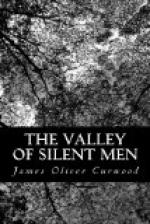Father Layonne performed the service in silence. Then at last the yearning overcame him to have the soul speak out, that his God might be more merciful, and he said: “My boy, you are sorry? You repent that you killed John Barkley?”
“No, I’m not sorry. It had to be done. And please don’t forget the cigars, will you, Father?”
“No, I won’t forget,” said the little missioner, and turned away.
As the door opened and closed behind him, the flash of humor leaped into Kent’s eyes again, and he chuckled even as he wiped another of the telltale stains of blood from his lips. He had played the game. And the funny part about it was that no one in all the world would ever know, except himself—and perhaps one other.
CHAPTER II
Outside Kent’s window was Spring, the glorious Spring of the Northland, and in spite of the death-grip that was tightening in his chest he drank it in deeply and leaned over so that his eyes traveled over wide spaces of the world that had been his only a short time before.
It occurred to him that he had suggested this knoll that overlooked both settlement and river as the site for the building which Dr. Cardigan called his hospital. It was a structure rough and unadorned, unpainted, and sweetly smelling with the aroma of the spruce trees from the heart of which its unplaned lumber was cut. The breath of it was a thing to bring cheer and hope. Its silvery walls, in places golden and brown with pitch and freckled with knots, spoke joyously of life that would not die, and the woodpeckers came and hammered on it as though it were still a part of the forest, and red squirrels chattered on the roof and scampered about in play with a soft patter of feet.
“It’s a pretty poor specimen of man that would die up here with all that under his eyes,” Kent had said a year before, when he and Cardigan had picked out the site. “If he died looking at that, why, he just simply ought to die, Cardigan,” he had laughed.
And now he was that poor specimen, looking out on the glory of the world!
His vision took in the South and a part of the East and West, and in all those directions there was no end of the forest. It was like a vast, many-colored sea with uneven billows rising and falling until the blue sky came down to meet them many miles away. More than once his heart ached at the thought of the two thin ribs of steel creeping up foot by foot and mile by mile from Edmonton, a hundred and fifty miles away. It was, to him, a desecration, a crime against Nature, the murder of his beloved wilderness. For in his soul that wilderness had grown to be more than a thing of spruce and cedar and balsam, of poplar and birch; more than a great, unused world of river and lake and swamp. It was an individual, a thing. His love for it was greater than his love for man. It was his inarticulate God. It held him as no




